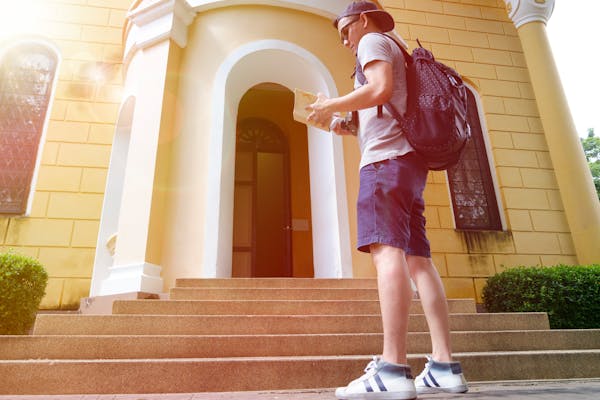TEMPO.CO, Jakarta – Actors and academics in the tourism sector predict that natural tourism will become a trend along with it new normal. Nature tourism makes it possible keep your distance and provide benefits for the related body health. Natural tourism activities such as camping are also recently in demand.
So is it true that camping is healthy and safe during a pandemic? The good news, camping is one of the safer forms of recreation today. Even so, it is not without risks.
What are the risks of camping?
Quoted from CNN Travel, four public health specialists in Michigan cited 36 activities based on their estimated risk level. They each made their own judgments and averaged the results.
On a scale of 1 to 10 – with 10 as the highest risk level – camping is a low-risk activity for contracting Covid-19, on a scale of 3. That’s the equivalent of playing golf and / or buying groceries at a store that follows safety protocols. In comparison, they rated playing tennis at level 1 and went to the gym and amusement park at level 8.
One of the assessment team, Dr. Matthew Sims, director of infectious disease research at Beaumont Health in Michigan, offers some tips as quoted from CNN Travel.
Sims distinguish camping from going to bars, high-risk areas that are usually cramped, crowded, and indoors. That’s a great environment for a virus like Covid-19 to spread, and it is ranked 9th on their risk scale.
“Closed areas tend to fill up with viruses from time to time.” Outdoors, on the other hand, the virus can spread more easily, Sims said. “Say someone coughs. You are not going to fill open spaces with viruses.”
 Camping with family or people in the same house is much safer than with other groups. BETWEEN PHOTOS / Hendra Nurdiyansyah
Camping with family or people in the same house is much safer than with other groups. BETWEEN PHOTOS / Hendra Nurdiyansyah
Solo Traveler or Going with Family is Safer
Solo travel and outings with the family are the best ways to travel.
“Going in a larger group – that would put your risk at a bit higher,” said Sims. “It will not be as safe as going with your own family. Interaction with other people outside the people you live with increases the risk,” he said.
Families sharing a home shouldn’t have to worry about sharing space when camping. “People sharing tents are generally in touch. When a family goes camping, they are already open to each other,” he said.
He said as long as family members are not exposed to other people, camping is a safe activity. Furthermore, staying in smaller groups is safer, “Stay away from people you don’t know,” Sims says.
“If you meet a new group, say while hiking, keep your distance from them. Staying alone is safer. Making friends is fun, but don’t hike with other groups and hang out with them when taking pictures,” he exclaimed.
 Cutlery and eat in a buffet way while camping is at risk of transmitting the plague when sharing with other groups or people. Source: motor1.com
Cutlery and eat in a buffet way while camping is at risk of transmitting the plague when sharing with other groups or people. Source: motor1.com
Things to avoid
Sims pointed out several other things that can increase the risk of contracting Covid-19:
– Singing around the campfire. “It makes more aerosol viruses. If you’re going to sing around a campfire, that’s a potential risk,” he said. So if you have a moment and just want to sing, keep your distance.
– Smoke from the campfire. It can make you cough and help spread the virus. If you have a campfire, don’t crowd it. In summer, even without a campfire the weather is still friendly.
– Food together. This can be a problem when you are camping, especially if you are going with a larger group.
“If you make a big pot of stew and everyone goes and gets from the same pot and uses the same utensils and spoons, that’s risky,” says Sims.
Avoid buffet-style situations, especially in groups outside the family. People may share “a large plate of burgers, hot dogs, or ribs. People can take the food and return it. This is risky,” he said.
Essential equipment additions.
Camping during a pandemic, your luggage will certainly increase. According to Sims, the participants in the workshop brought hand sanitizer. Make sure the cleaner contains at least 60 percent ethanol or 70 percent isopropanol, which is recommended by United States Centers for Disease Control and Prevention (CDC).
 When around a campfire exercise distance, wear a mask, and cover your mouth when coughing. Dock. Brasanda Ranch
When around a campfire exercise distance, wear a mask, and cover your mouth when coughing. Dock. Brasanda Ranch
Also, bring a mask. Even if nature has fresh air, you never know you suddenly have to go to the store. “Even if you feel like you won’t interact with anyone, bring a mask,” he said.




More Stories
Top 4 Benefits of Hiring a Professional Bail Bondsman
Transforming Your Smile with Modern Dental Techniques
Technology and Nature – Two Challenges For Tourism at the Dawn of the Twenty-First Century